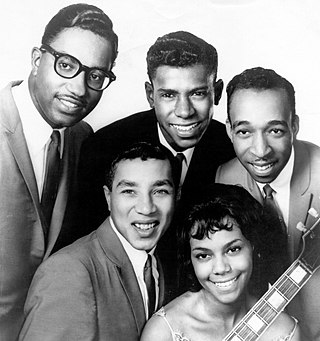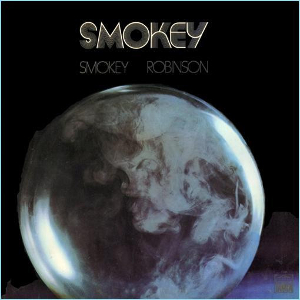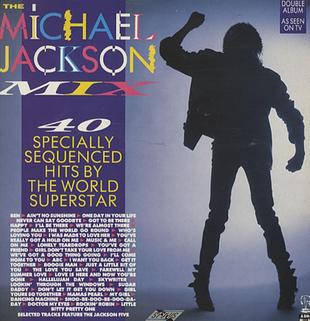
William "Smokey" Robinson Jr. is an American R&B and soul singer, songwriter, record producer, and former record executive. He was the founder and frontman of the pioneering Motown vocal group the Miracles, for which he was also chief songwriter and producer. He led the group from its 1955 origins, when they were called The Five Chimes, until 1972, when he retired from the group to focus on his role as Motown Records vice president. Robinson returned to the music industry as a solo artist the following year. He left Motown in 1999.

The Miracles were an American vocal group that was the first successful recording act for Berry Gordy's Motown Records, and one of the most important and most influential groups in the history of pop, soul, R&B and rock and roll music. The group's international fame in the 1960s, alongside other Motown acts, led to a greater acceptance of Rhythm & Blues and pop music in the U.S., with the group being considered influential and important in the development of modern popular music.

Smokey is the debut studio album by American soul singer, songwriter, and producer Smokey Robinson. It was released on June 19, 1973, by Tamla Records and was Robinson's first solo record after his departure from The Miracles. The album featured the single "Sweet Harmony", which was his tribute to his former singing partners in the Miracles: Bobby Rogers, Pete Moore and Ronnie White. Smokey was arranged by Dave Blumberg, Gene Page and Willie Hutch. It also featured the song "Baby Come Close", his first solo hit single, and the single "Just My Soul Responding", a protest song dealing with ghetto life in America, and the plight of the American Indian. Smokey peaked at number 70 on the Billboard albums chart, on which it spent 19 weeks.
David T. Walker is an American soul/R&B, and jazz guitarist. In addition to numerous session musician duties since the early 1970s, Walker has issued fifteen albums in his own name.

"Love Machine" is a 1975 single recorded by Motown group the Miracles, taken from their album City of Angels. The song was a number-one hit on the Billboard Hot 100, and the biggest-selling hit single of the Miracles' career. This single was one of two Billboard Hot 100 top-20 hits recorded by The Miracles with Billy Griffin as lead vocalist; the other is 1973's "Do It Baby". Griffin had replaced Miracles founder Smokey Robinson as lead singer in 1972. The song features a growling vocal by Miracle Bobby Rogers, with group baritone Ronnie White repeating "yeah, baby" throughout the song.

Away We a Go-Go is a 1966 album by Smokey Robinson & the Miracles. The album features the singles "(Come 'Round Here) I'm the One You Need", a Billboard top 20 Pop hit, written and produced by Holland-Dozier-Holland; and "Whole Lot of Shakin' in My Heart ", written and produced by Frank Wilson. The album uses a different take of "I'm the One You Need" than what was issued on the single. A third single was planned for release from this album, the tune "More, More, More ", cataloged as Tamla T-54005, but the single was never released. It was later covered by the regional group Bob Brady and The Con Chords. Another single from this album, the Stevie Wonder/Ivy Jo Hunter composition of "Can You Love a Poor Boy", was released to radio stations as a special Disc Jockey Advanced Single, Tamla T-540, but was never given an official catalog number for general release. It too, inspired cover versions by Gil Bernal and Ronnie Walker.

Greatest Hits from the Beginning is a compilation double LP by The Miracles released in 1965. This was the first double album ever released by the Motown Record Corporation. It covers most of the group's hits from their pre-1965 albums, such as "Shop Around", "Who's Lovin’ You", "You've Really Got A Hold On Me" and "Mickey's Monkey", as well as the non-album singles from 1964: "I Like It Like That" and "That's What Love Is Made Of". The album was a success, reaching #21 on the Billboard Pop Album Chart. It was also the first Miracles album to chart on the Billboard R&B Album chart, where it was an even bigger success, peaking at #2.

"More Love" is a 1967 hit single recorded by the American soul group The Miracles for Motown Records' Tamla label. The single, included on the group's 1967 album Make It Happen, later reissued in 1970 as The Tears of a Clown. Kim Carnes's 1980 cover of the song reached the Top 10 of Billboard's Adult Contemporary and Hot 100 charts.

City of Angels is an album by the Motown soul group The Miracles, released on Motown Records' Tamla label in September 1975. The group's fourth album recorded after replacing lead singer Smokey Robinson with Billy Griffin in 1972, City of Angels is a concept album, depicting of a man from "Anytown, U.S.A." who follows his estranged girlfriend Charlotte to Los Angeles, where she has gone in hopes of becoming a star. All of the tracks on the album were written by Billy Griffin and Miracles bass singer Pete Moore. Freddie Perren and Moore served as the album's producers.
William L. Griffin is an American singer and songwriter. He replaced Smokey Robinson as the lead singer of The Miracles in 1972.

"Baby, Baby Don't Cry", released in December 1968, is a single recorded by The Miracles for Motown Records' Tamla label. The composition was written by Miracles lead singer Smokey Robinson, Motown staff writers Al Cleveland and Terry Johnson, a former member of The Flamingos. Robinson, Johnson, and Miracles member Warren "Pete" Moore were the song's producers.

1957–1972 is a 1972 double album by The Miracles on Motown Records' Tamla label. This two-record set is noted as the group's final series of live concerts with original lead singer Smokey Robinson, recorded over a period of three days, July 14–16, during the 1972 National Parks Centennial, at the Carter Barron Amphitheater in Washington, D.C., and charted at No. 75 on the Billboard Top 200 Album chart, and at No. 14 on its R&B Album chart. During the show, Smokey's wife, original Miracles member Claudette Rogers Robinson, who stopped touring with the group in 1964, reunited with the Miracles on stage for the first time in eight years. As a celebration of the group's fifteen years together, The Miracles made this an "all request" show, where audience members could choose which of the group's long string of hits they wanted performed. Also, at the end of the concert, Miracles fans were introduced to the group's new lead singer, Billy Griffin. According to Smokey's autobiography, Smokey: Inside My Life, The Miracles' final concert was videotaped in movie form, but was never publicly released. However, 1957–1972 was released on CD originally in 1990, and re-released again in 2004 along with The Miracles' 1969 "Live" album in the 2004 Motown/Hip-O Select release Smokey Robinson and The Miracles: The Live Collection.

Flying High Together is an album by Smokey Robinson and the Miracles on Motown Records' Tamla label, released in 1972. It is noted as The Miracles' last studio album with original lead singer Smokey Robinson, who retired from the act to concentrate on his duties as vice president of Motown. The album charted at #46 on the Billboard Pop Album chart, and featured two singles: the appropriately named "We've Come Too Far to End It Now", which matched the parent album's chart position on the Billboard singles chart, charting at #46, and reached the Top 10 of the Billboard R&B singles chart, charting at #9, and "I Can't Stand to See You Cry", which charted at #45 Pop, and #21 R&B.

Renaissance is a 1973 album by R&B group The Miracles on Motown Records' Tamla label. It was the first album by the group not to feature original lead singer Smokey Robinson on lead vocals, instead featuring him as executive producer. Robinson was replaced by lead singer Billy Griffin.

"Do It Baby" is a 1974 single recorded and released by the Motown R&B group The Miracles. The song was taken from the album of the same name, and written by Motown staff songwriters Freddie Perren and Christine Yarian and produced by Perren.
"Come On Do the Jerk" was a 1964 song recorded by R&B group the Miracles on Motown Records' Tamla label subsidiary. It was co-written by Miracles members Pete Moore, Bobby Rogers and Smokey Robinson and drummer Donald Whited. A single-only release, it did not appear on any original Miracles studio album, and was the group's last single release of 1964. Robinson and fellow Miracle Bobby Rogers were the song's producers. The flip side, "Baby Don't You Go", was also a popular regional hit but was not released on CD until The 35th Anniversary Collection in 1994. Both sides of this single received new stereo mixes for the 2002 compilation Ooo Baby Baby: The Anthology.
"Point It Out" is a 1969 recording by Motown Records R&B group The Miracles on that label's Tamla subsidiary. This mid-tempo song was a national Billboard Top 40 Pop hit, reaching #37 on the Hot 100, and was a Top 10 R&B hit was well, reaching #4. It was taken from their album "A Pocket Full Of Miracles", and was written by Miracles members William "Smokey" Robinson and Marv Tarplin, along with Motown staff songwriter Al Cleveland.
We've Come Too Far to End It Now was a 1972 single by Motown Records R&B group The Miracles on its Tamla Label subsidiary (T54220F) and taken from their 1972 album, Flying High Together, the group's final studio album with original lead singer Smokey Robinson. This song charted at #46 on the Billboard Pop Chart, and reached the Top 10 of its R&B chart, peaking at #9.
"Give Me Just Another Day" (T54240F) is a song written by Leon Ware and released as a single in 1973 by Motown R&B group The Miracles, issued on that label's Tamla Records subsidiary. It was the first single release from the group's album, Do It Baby, which was released the following year.

The Michael Jackson Mix is a compilation album by American singer and recording artist Michael Jackson, released in 1987. Available as a double LP, double cassette and double CD, the album contains 40 songs from Jackson's Motown career – solo and with The Jackson 5 – edited together in four separate megamixes: "Love Mix 1" and "Love Mix 2" on the first LP, cassette and CD, and "Dance Mix 1" and "Dance Mix 2" on the second LP, cassette and CD.














